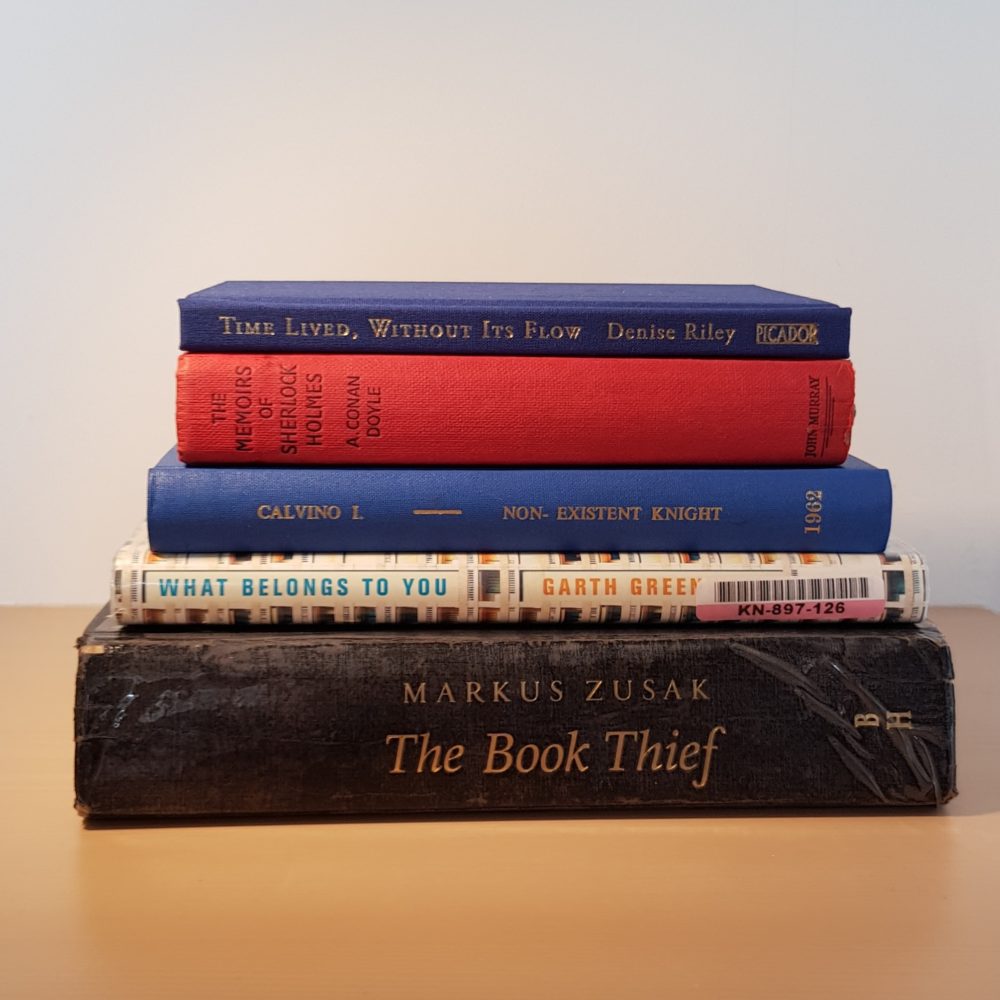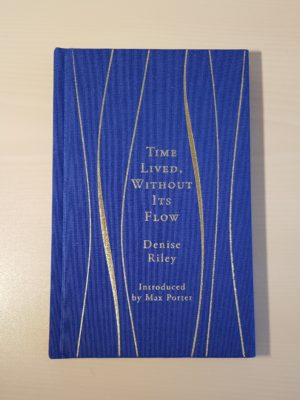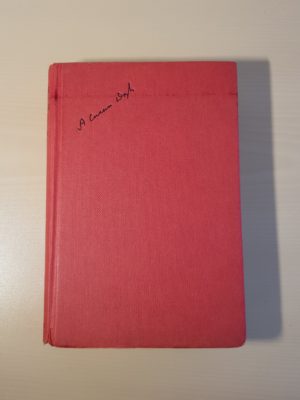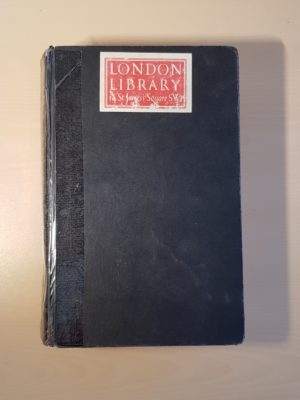What I’ve been reading this month

These five books have kept me company in May: three have rather dull covers which perhaps undermine my photo-heavy format.
Time Lived, Without Its Flow by Denise Riley
This short book was originally published in 2012, but I read the 2019 edition with a new introduction by Max Porter. It was extraordinary.
The book concerned Riley’s reaction to her son’s death, but she concentrated on a single element of that experience: the altered perception of time, or perhaps more accurately, the absence of a perception of time, which followed the death. Riley began with forty-one pages of notes written at intervals between two weeks and three years after her son’s death, reflecting on her own experiences and relevant snatches of literature and poetry. This was followed by thirty pages of reflective postscript.
The decision to focus on this single aspect of grief—the perception of time—is brave and brilliant, and Riley’s exploration and reflection altered my own perception of what this must be like. I read parts of this at the same time as the novel Human Traces which has a section covering broadly similar themes from a distinct perspective. The contrast between Faulks’s fiction and Riley’s reality was arresting.
There was one paragraph right at the start of Riley’s book which particularly struck me, and pulled me into the rest of her reflections:
There’s no specific noun for a parent of a dead child; nothing like the terms for other losses such as ‘orphan’ or ‘widower’. No single word exists, either, for an ‘adult child’ – an awkward phrase which could suggest a large floppy-limbed doll. For such a historically common condition as outliving your own child, the vocabulary is curiously thin. The same phrases recur. For instance, many kindly onlookers will instinctively make use of this formula: ‘I can’t imagine what you are feeling’. There’s a paradox in this remark, for it’s an expression of sympathy, yet in the same breath it’s a disavowal of the possibility of empathy. Undoubtedly it’s very well meant, if (understandably) fear-filled. People’s intentions are good; a respect for the severity of what they suppose you’re enduring, and so a wish not to claim to grasp it. Still, I’d like them to try to imagine; it’s not so difficult. Even if it’s inevitable, or at any rate unsurprising, that those with dead children are regarded with concealed horror, they don’t need to be further shepherded into the inhuman remote realms of the ‘unimaginable’. So I want to try, however much against the odds, to convey only the one striking aspect: this curious sense of being pulled right outside of time. as if beached in a clear light.
What Belongs to You by Garth Greenwell
I picked this up because the sequel, Cleanness, has had a lot of great press reviews lately. What Belongs to You was first published in 2016, though the first third was published as a novella in 2011.
The novel concerned an American professor who moved to Sofia to teach. He was already culturally isolated when he developed a sexual relationship with a male prostitute, Mitko, and became a little uncertain about his own identity. He reflected on the parallels between being an outsider in Sofia and being an outsider as a gay youth in the south of the USA.
There was some exceptionally thoughtful and moving writing in this book, and both the nameless professor and Mitko were fully realised as characters. There was a particularly good subplot involving a diagnosis of syphilis. But somehow, I just didn’t feel particularly engaged by the plot. It may be because I too recently read the James Baldwin classic Giovanni’s Room which covered some of the same territory (albeit in a completely different setting and time period).
I enjoyed What Belongs to You enough that I will pick up the sequel at some point to see what all the fuss is about.
The Memoirs of Sherlock Holmes by Arthur Conan Doyle
Another eleven short stories featuring Sherlock Holmes, including The Final Problem. This collection was first published in 1894; I read a handsome well-thumbed 1959 edition courtesy of Newcastle City Library, and the sensory experience added to my enjoyment.
While I found this collection a little more interesting than The Adventures of Sherlock Holmes, I still missed being drawn into a full-length novel. Luckily, The Hound of the Baskervilles is next in the series.
The Non-Existent Knight by Italo Calvino
This Calvino novella was first published in Italy in 1959, with an English translation by Archibald Colquhoun published in 1962. I read a lovely 1962 edition from the London Library, which (according to the date labels) had been borrowed more than forty times before I was born.
The story, supposedly recorded by a nun called Sister Theodora, concerned Agilulf and Raimbaud, two paladins of Charlemagne. Agilulf was the eponymous non-existent knight: a sentient empty suit of armour, celebrated for being a perfect knight and meeting all expectations of knighthood. Raimbaud is a younger knight who struggles to balance his passion for humanity against the expectations placed upon him by knighthood.
This allegorical satire which felt relevant to the modern world: how often do we all feel like we are expected to fit a role and be non-existent as personalities? It also made me laugh, especially Sister Theodora’s commentary at the start of many chapters about the difficulty of drafting the story, and the fact that she is mostly making up the events she is recording.
All of that said: I found this slightly trickier to read than The Cloven Viscount, the other one of Calvino’s “Our Ancestors” trilogy that I’ve read to date. I think this is because I haven’t read much about the court of Charlemagne or many classic tales of chivalry, and so was a bit confounded by some basic elements (including the word ‘paladins’ which I had to look up). Readers more versed in that world will find it easier to jump straight in!
The Book Thief by Marcus Zusak
This was the 2005 mega-bestseller about a pre-adolescent girl, Liesel Meminger, growing up in Nazi Germany during the Second World War. The book was narrated by Death.
For the first four-fifths of the book, I struggled with the style of narration. Having Death as a narrator in this context is a strong idea, but Zusak didn’t really seem to build on that creative choice in an interesting way, other than by making Death an affably weird character. However, Zusak gave Death an odd style of narration in which the text was filled with bizarre idioms and broken up in affected ways. I found this style tedious. But then, somewhere around the 400-page mark, the style “clicked” for me and I started to find its rhythm and enjoy the quirkiness.
The plot seemed to derive most of its power and interest from the historical context rather than from the events in Liesel’s story specifically, and I’m not sure how I feel about that. For a book in which the proximate cause of a lot of the suffering is the actions of the allied forces in the war, it felt oddly lacking in moral complexity. It all felt a bit sentimental to me.
This post was filed under: What I've Been Reading, Archibald Colquhoun, Arthur Conan Doyle, Denise Riley, Garth Greenwell, Italo Calvino, James Baldwin, Marcus Zusak, Sebastian Faulks, Sherlock Holmes.




